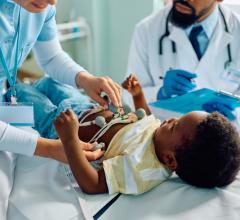
March 11, 2025 — CareDx, Inc. – The Transplant Company – recently announced that AlloSure is now commercially available for pediatric heart transplant patients of all ages and patients who have received a simultaneous pancreas-kidney (SPK) transplant.
Both indications are approved by the New York State Clinical Laboratory Evaluation Program, demonstrating that AlloSure has met the most rigorous validation standards for laboratory developed tests (LDTs).
CareDx is a precision medicine company focused on the discovery, development, and commercialization of clinically differentiated, high-value healthcare solutions for transplant patients and caregivers.
AlloSure Heart, available for patients aged 15 years and older since 2020, is now clinically validated and commercially available for use in pediatric patients under 15, including infants. Studies have shown that AlloSure Heart can detect biopsy proven Acute Cellular Rejection (ACR) and AMR (Antibody Mediated Rejection) in all ages of pediatric heart transplant patients, consistent with its performance in adults.1-4 In a prospective study, the use of AlloSure dd-cfDNA for surveillance monitoring in pediatrics demonstrated an 81% reduction in surveillance endomyocardial biopsies (EMB).1
"The availability of AlloSure dd-cfDNA for all pediatric heart transplant patients is a major development. Our goal is for every one of our patients, including our youngest heart transplant recipients, to thrive with their transplanted heart. With molecular surveillance we can monitor organ health while avoiding the inconvenience and discomfort of unnecessary biopsies,” said Dr. Brian Feingold, Medical Director, Pediatric Heart Transplantation, UPMC Children’s Hospital of Pittsburgh. “We consider the use of surveillance biopsies outside of the first 2 or 3 months after transplantation to be outdated now that AlloSure is available for every pediatric heart transplant recipient.”
Simultaneous pancreas-kidney (SPK) transplants are known to improve the quality of life and long-term survival of patients with insulin dependent diabetes and advanced renal disease.5 As with other organ transplants, the organs are at risk of rejection. AlloSure Kidney has been clinically validated to identify rejection and graft injury in SPK patients.6-7 AlloSure Kidney can improve the management of SPK patients by differentiating those at increased risk of rejection, who are otherwise stable, from patients at low likelihood of rejection.
“It is an honor to have led some of the early studies and to see that AlloSure Kidney is now clinically validated and commercially available for use in patients who have undergone simultaneous pancreas-kidney transplantation,” said Dr. Dolamu Olaitan, MBBS, Transplant Surgeon, Rush University Medical Center. “I have witnessed firsthand the significant benefits for patients with diabetes and kidney failure of receiving a pancreas and kidney transplant. Now, we have a well-validated, non-invasive tool to monitor organ rejection and injury, which has the potential to improve their quality of life and long-term outcomes.”
"We are thrilled to introduce two new expanded indications of AlloSure, addressing critical needs in transplant patient care. Until now, children under 15 who received a heart transplant could only be tested by exception, but now they can receive routine AlloSure Heart testing. Additionally, for patients who have undergone a simultaneous pancreas-kidney transplant, we have a solution to meet their needs,” said Robert N. Woodward, CareDx Chief Scientific Officer.
In 2024, over 4,500 heart transplants were performed in the U.S. with about 10 percent under the age of 18.8 Additionally, in 2024 more than 700 patients received an SPK transplant.8
For more information, please visit www.caredx.com.
References:
-
Feingold B, Rose-Felker K, West SC, et al. Early findings after integration of donor-derived cell-free DNA into clinical care following pediatric heart transplantation.Pediatr Transplant. 2022 Feb;26(1):e14124. doi: 10.1111/petr.14124.
-
O'Halloran CP, Tannous P, Arva NC, et al. Histopathology, mRNA expression profile, and donor-derived cell-free DNA for assessment of rejection in pediatric heart transplantation.Pediatr Transplant. 2024 May;28(3):e14705. doi: 10.1111/petr.14705.
-
Akabas L, Bravo SA, Zhang Y, et al. Progress in Noninvasive Surveillance for Acute Rejection in Pediatric Heart Transplant Recipients: A Real-World Analysis of Donor-Derived Cell-Free DNA-Based Surveillance Protocol.Clin Transplant. 2024 Oct;38(10):e15481. doi: 10.1111/ctr.15481.
-
Feingold B, Rose-Felker K, West SC, et al. Short-term clinical outcomes and predicted cost savings of dd-cfDNA-led surveillance after pediatric heart transplantation.Clin Transplant. 2023 May;37(5):e14933. doi: 10.1111/ctr.14933.
-
Boggi U, Vistoli F, Andres A, Arbogast, et al. First World Consensus Conference on pancreas transplantation: Part II - recommendations. Am J Transplant.2021 Sep;21 Suppl 3(Suppl 3):17-59. doi: 10.1111/ajt.16750.
-
Yoo A, Riedel A, Qian I, et al. An Initial Analysis of the Baseline Levels of Dd-cfDNA After Pancreas Transplantation: A Prospective Study From High-volume Centers in the United States. Transplant Direct. 2023 Mar 15;9(4):e1459. doi: 10.1097/TXD.0000000000001459.
-
Williams MD, Fei M, Schadde E, et al. Early Experience Using Donor-derived Cell-free DNA for Surveillance of Rejection Following Simultaneous Pancreas and Kidney Transplantation.Transplant Direct. 2022 Apr 7;8(5):e1321. doi: 10.1097/TXD.0000000000001321.
-
OPTN HRSA national databasehttps://optn.transplant.hrsa.gov/data/view-data-reports/national-data/, Accessed online March 6, 2025.


 May 19, 2025
May 19, 2025 









